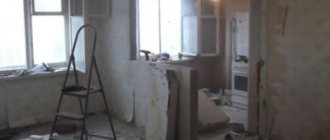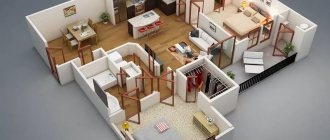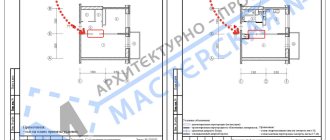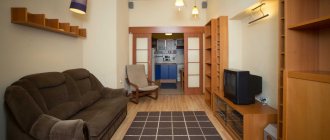15.08.2017
Redevelopment projects
Many owners believe that if non-load-bearing walls are demolished or erected during the redevelopment process, then approval is not required. Let's try to figure out in which cases this is really the case, and in which changes still need to be legalized.
According to current legislation, redevelopment is considered to be any work in an apartment, the results of which must be reflected in the technical passport of the BTI. It follows from this that sometimes it is still possible to do without approval.
What does redevelopment mean?
Any types of redevelopment of residential properties that require changes to the technical passport are called apartment redevelopment. During the renovation process, cosmetic finishing and modification of the space may be necessary, including increasing or decreasing the area. This is necessary to transform a residential property. Such actions must take into account the requirements established by law and be accompanied by permitting documentation.
This includes any transformation of such living space parameters as operational and technical. They are indicated as changes in the floor plan log. Reconstruction refers to the following procedures:
- modification of the characteristics of the living space;
- change of communication systems (this item includes reinstallation of heating equipment);
- any types of changes relating to information in technical documents and the certificate of ownership of the apartment;
The Housing Code of the Russian Federation regulates a list of works that are allowed to be carried out only subject to receipt of documentary confirmation from the relevant services (Article 26):
- transformation of the structures of doors, walls and window openings;
- changing stairs between floors, built-in wardrobes, bathrooms;
- modification of sewer outlets and vents;
- replacing the floor covering (an example is pouring a new screed and installing a heated floor);
- change in the functional affiliation of objects on the territory of the living space.
Attention! This paragraph refers to the reorganization of facades (including the installation of air conditioning on the front walls), the conversion of a residential building into a domestic one, glazing of loggias and any modifications affecting the architecture of the building.
Such a reconstruction does not affect the data listed in the apartment layout, but the owner is obliged to coordinate them with the design documentation.
2019 demolition of a curtain wall does not need to be approved
If the attempts are unsuccessful, the housing will have to be returned to its original form. Do I need permission to renovate non-load-bearing walls? The redevelopment of an apartment is conceived with the aim of improving the living conditions of citizens.
The question arises: can the structure of non-load-bearing walls be affected or not? Procedure for dealing with illegal redevelopment of an apartment Simple refurbishment can be done without permission, if you follow the basic rules.
2 actions that cannot be done without permission:
- enlarge the bathroom;
- move plumbing fixtures outside the bathroom.
After the work has been carried out, they need to be recorded in the technical inventory bureau, and then legalized through the Moscow Housing Inspectorate. You can do without permission if non-load-bearing partitions are dismantled and then put back together again. It is allowed to improve the quality of partitions.
Demolition and construction of non-load-bearing walls: in what cases approval is required
Do I need to approve the relocation of a doorway in a non-load-bearing wall? This option for changing the configuration of an apartment most often raises questions among owners. In their opinion, on the one hand, a doorway in a non-load-bearing wall is a redevelopment, but on the other hand, after such work nothing disappears and nothing new appears, since the opening only moves.
In fact, changes are still present: the area remains unchanged, but the plan will not remain the same. In the BTI technical plan, doors are indicated in certain places.
Relocating an opening in a non-load-bearing wall inevitably leads to a change in the graphic part of the technical plan. Therefore, approval in this case will be required.
But there is one nuance here. As a rule, such work is carried out by re-laying the entire wall.
Is it necessary to legalize the redevelopment of non-load-bearing walls?
- Associated with the construction or removal of load-bearing walls, resulting in the creation of a room without natural light or centralized heating devices;
- As a result, changes occur in the architecture of the building.
It is strictly prohibited:
- Build a gas pipeline into the wall;
- Close ventilation hatches;
- Combine staircases and corridors;
- Change the location of kitchens and bathrooms;
- Connect the territory of the loggia and the area of internal accommodation;
- Carrying out dismantling of thresholds located at the exits from the balcony;
- Dismantling window sill blocks;
- Enlargement of existing openings in external structures at the entrance from the loggia;
- Disassembling the window sill block, if it is used to hold the balcony slab;
- Connection of two residential properties if their owners are different people.
What does not need to be agreed upon when remodeling an apartment?
The reconstruction includes procedures such as:
- Changes in housing parameters;
- Change of communication systems, including reinstallation of heating equipment;
- Any modifications noted in the technical and title documentation for the real estate.
Article 26 of the Housing Code of the Russian Federation establishes a list of works, the implementation of which is subject to obtaining permits from the relevant services:
- Transformation of the location of walls, windows and doorways, stairs between floors, cabinets built into structures, bathrooms and kitchen appliances, sewers and ventilation hatches;
- Changing the functionality of an object inside an apartment.
Is it necessary to legalize redevelopment in 2021 when changing non-load-bearing walls?
Important The application may be submitted through intermediaries - the government center Coordination of the relocation of the doorway It would seem that the doorway can be easily moved, because the layout of the housing remains the same.
In fact, the list of what kind of apartment redevelopment can be done without permission is not that long. Attention: To change the location of the doorway, you must obtain a permit. The area remains the same, but the layout of the apartment is adjusted. Those.
the BTI plan contains a specific layout of the doorway. But it is changing, so you need to get permission to work. But you can get by with drawing up one sketch if the new design is made in the same place, and only the location for installing the doorway changes.
What changes will have to be abandoned. What redevelopment is permitted is determined by law.
What redevelopment can be done without permission?
- glazing of loggias or balconies, if this is not accompanied by a change in design (an example is the combination of two balconies);
- moving the doorway, sealing it, enlarging it, creating it or reducing it, if it is not in a supporting structure;
- remaking a doorway into an arch, or a window between rooms;
- changing a shower or bathtub;
- moving the electric stove to another part of the kitchen;
- construction or demolition of storage rooms, wall-mounted ones too.
Attention! All other cases require the owner to contact the relevant organizations before starting repair work. There you need to get permission to make changes. Legislation Redevelopment of non-load-bearing walls is regulated by the regulations of the Housing Code.
Source: https://dolgoteh.ru/2018-snos-nenesushhej-steny-ne-nuzhno-soglasovyvat/
What changes need approval?
The following types of redevelopment require documentary permission:
- Moving interior partitions, dismantling and rebuilding.
- Moving and installing door screens.
- Reducing or increasing square meters of residential premises.
- Transformations of floor openings.
- Partial demolition of the main walls.
- Creating a corridor.
- Modification of kitchen or bathroom space.
- Moving the bathroom, kitchen or toilet to other parts of the apartment.
- Combination of bathrooms.
- Creation of new rooms.
- Expansion of space through the use of non-residential premises.
- Changing gas equipment to another.
- Relocation of fuel systems and electrical household points.
- Creating a ventilation outlet.
Important! All of the work listed will require permission from the relevant authorities.
There are also prohibited types of reconstructions that relate to the reconstruction of housing:
- inconsistent with other owners or tenants;
- posing a danger in terms of violation of sanitary, fire, operational, technical and construction standards;
- complicating the residence of residents or the conditions of use of the housing facility;
- affecting load-bearing structures for the construction of rooms without windows or central heating.
It is also prohibited to carry out any work that will change the architecture of the house.
Demolition of a non-load-bearing wall in an apartment, approval – Legal protection online
In accordance with the current norms of the Housing Code of the Russian Federation, redevelopment of an apartment requires obtaining permission from the relevant authorities. However, some types of redevelopment actions do not require such permission.
In this article we will answer the following questions: what types of redevelopment are usually distinguished? which of them should be approved by higher housing authorities, and which can be carried out without permission? Find answers to these and other questions in this article.
What redevelopment is not legalized
The Russian Housing Code uses 2 terms that relate to internal modifications of an apartment - redevelopment and reconstruction. The law obliges owners to enter all information about modifications into the technical passport.
Redevelopment is a change in utilities, such as water supply, sewerage, heating and ventilation. This is stated in Art. 25 of the Housing Code.
Attention! If a gas stove is replaced with an electric one, new bathrooms are installed or existing bathrooms are moved, this is also a refurbishment.
Changing the configuration inside an apartment is called redevelopment. This concept includes moving partitions between rooms, doorways, reducing or increasing the number of square meters and rooms, as well as the construction of utility rooms. The creation of vestibules in the entrance is also a redevelopment.
There is no need to contact the BTI if the owner is planning a routine cosmetic renovation, since this does not imply changing the configuration of the apartment.
Approval and entry of information will not be required in the following cases:
- gluing new wallpaper;
- replacing flooring or sealing;
- wall insulation;
- replacing doorways and walls;
- finishing work on the arrangement of the balcony;
- air conditioner installation;
- connection of any type of antenna;
- replacement of plumbing fixtures and pipes;
- installation of a hood;
- moving electrical outlets.
FAQ
The recommendations collected in this section will help you coordinate the demolition of a wall in your apartment and correctly solve typical practical problems. If difficulties arise, study thematic information on the site. In the most difficult situations, turn to an experienced lawyer for help - advice can be obtained directly on our portal.
Redevelopment with a mortgage
In the list of standard conditions, banks set a limit on changes that significantly affect the value of the collateral. Unambiguous prohibitions are rarely used. To receive a positive answer, you will have to prove an improvement in consumer parameters (increase in value) after the demolition of the wall.
Correction of information in the USRN database is possible by agreement with the lender. It is recommended to complete the relevant documents in advance.
What are the dangers of uncoordinated redevelopment?
Illegal demolition of walls is punishable by a fine of up to 2.5 thousand rubles. If violations of current standards are detected, an increase of up to 5 thousand rubles is applied. rate. The composition and volume of violations have a significant impact on possible costs. In the most difficult situations, in addition to compensation for damage, the court has the right to use criminal penalties.
For your information! A one-time fine for a legal entity for such violations is up to 300 thousand rubles.
What to do if a crack appears in the wall
If such defects are detected, contact the management company. If a wall is cracked, authorized representatives of this organization must:
- perform an inspection;
- draw up an act;
- install control marks to check crack growth;
- eliminate causes that violate safety standards.
If the walls crack due to redevelopment done by a neighbor, file a claim with the court at the place of residence. To prove your case, you will need an expert opinion.
When a crack has formed as a result of a man-made accident, during the “natural” destruction of a dilapidated building, you should contact the local administration. A special commission of the municipality makes decisions on the demolition of a building or restoration work. Current legislation provides for measures to relocate residents and pay compensation.
If a wall in an apartment is cracked, you need to complain to the municipality. The effect of the appeal will come faster if you reinforce it:
- collective statement of several residents;
- results of an expert examination of the condition of the crack.
What to do if the wall has already been demolished
To formalize the work already completed, appropriate changes are made to the presented algorithm:
- They contact the BTI to organize a visit of a specialist and record the changes.
- They make a project with calculations (if the load-bearing walls in the apartment have been remodeled).
- Obtain opinions from the Ministry of Emergency Situations, SES, and other organizations (if necessary).
- They contact the administration, which refuses approval.
- With this refusal they apply to the district court at the place of residence, preparing a statement of claim for approval of the redevelopment.
- As a result of the investigation, approval for the demolition of the wall is obtained.
- Changes are registered in the Unified State Register of Real Estate.
The information presented in the publication explains where to go after a crack appears in the apartment. The relevant sections show an algorithm of actions for coordinating redevelopment (demolition of a wall) taking into account different initial conditions. Before applying the recommendations, you should clarify the current rules with the relevant authorities. Particular attention is paid to the preparation of accompanying documentation.
Use the site materials to clarify information on the topic. Contact the portal's duty lawyer for professional advice. Repost, like. Share your own experience in the comments.
Read further: illegal redevelopment of an apartment - consequences and responsibility.
Coordination of dismantling or moving non-load-bearing walls
The following works require official registration:
- partial dismantling of non-load-bearing structures;
- construction of new partitions (for example, arrangement of a dressing room);
- demolition of the wall between the room and the kitchen;
- modifications of load-bearing structures.
If you do not coordinate the redevelopment, this threatens with unpleasant results in the form of problems when selling the apartment. Legitimation is carried out with the help of housing inspectors or administration workers. You are allowed to submit an application through the MFC.
Doorways
The relocation of openings is also agreed upon, since while maintaining the area, the layout of the apartment still changes. For this reason, you should enter updated data into the BTI registration certificate after obtaining permission.
Sometimes it gets by by drawing up one sketch in the case of installing a new structure in the old part and changing only the location for the door opening equipment.
Approximate terms and cost of work
| Actions | Expenses | |
| Time, days | Money, rub. | |
| First contact with BTI | 10-14 | 500 – 1 500 |
| Creation of a package of project documentation | 14-60 | 2 500 – 35 000 |
| Additional permits (SES, Ministry of Emergency Situations, etc.) with the help of specialists | 15-30 | 5 000 – 20 000 |
| Coordination of the demolition of the wall with the local administration | 30-45 | – |
| Secondary application to the BTI, preparation of a technical passport | 10-14 | 1 200 – 4 500 |
| Registration of changes in the Unified State Register of Real Estate | 3-14 | 350 |
Prohibited redevelopment
Compliance with legal regulations is strictly for property owners. Any project can be implemented if finances are available, but the possibility of its legalization should be clarified in advance.
Three prohibited options for changing the layout include:
- Moving the toilet to parts of the apartment located above the living quarters of the neighbors below.
- Installation of heated floors powered by central heating.
- Combining a kitchen and a room by equipping the dining area with a gas stove.
Attention! Any connections to common house systems are not legal. Property owners have similar rights to operate an apartment building.
Any actions that threaten the integrity of the house and disrupt the operation of engineering structures are prohibited.
Notification without consent
In a number of situations, redevelopment is not accompanied by obtaining permission from the BTI, however, notifying the Housing Inspectorate and making changes to the technical documentation is a must. The visit is carried out upon completion of repair work.
If you ignore this issue, problems will arise when concluding real estate transactions or entering into inheritance.
After redevelopment, you need to warn the inspectorate about the following:
- Creating interior openings or sealing them.
- Glazing of a balcony or loggia.
- Dismantling a non-load-bearing wall.
- Construction of additional lightweight partitions that do not increase the load on the floor.
- Rework of vestibules and complete demolition.
Important!
Demolition of door openings or walls is allowed only between rooms. Combining neighboring apartments is prohibited; this is possible only after prior approval. Even if there is no threat to the building and other apartments, any modification that does not comply with the general plan must be recorded in the BTI documentation. When there is no impact on the design and no hazards have been ruled out, repairs are not approved.
When planning global transformations of an apartment, which include changes to wall structures and general building communications, you need to visit the Housing Administration in advance and coordinate all planned changes, taking into account the smallest details.
What are the consequences of illegal redevelopment of an apartment?
In accordance with the current norms of the Housing Code of the Russian Federation, redevelopment of an apartment requires obtaining permission from the relevant authorities. However, some types of redevelopment actions do not require such permission.
In this article we will answer the following questions: what types of redevelopment are usually distinguished? which of them should be approved by higher housing authorities, and which can be carried out without permission? Find answers to these and other questions in this article.
Kinds
In accordance with the Housing Code of the Russian Federation, the following types of changes in residential premises should be distinguished:
- Reorganization . According to Article 25 of the Housing Code of the Russian Federation, this term should be understood as the following changes: installation/reinstallation of electrical and pipeline systems, ventilation networks, replacement of stoves (from gas to electric), installation of additional or relocation of existing bathrooms;
- Redevelopment refers to making changes to the design of a room: reinstalling doorways, installing partitions between rooms, changing the area of individual rooms, creating additional rooms in general (increasing the number of rooms).
Read about where exactly you can agree on the need to legalize changes made to residential premises in the next section.
Institutions of appeal
In order to make sure what changes to the residential premises require permission, you should seek advice from one of the following authorized authorities:
- Housing Inspection;
- Municipal Department of Capital Construction.
Subsequently, if the need to obtain permission for the planned redevelopment is confirmed, you will have to contact the same listed authorities.
In addition to the listed authorities, the following can answer questions related to redevelopment:
- qualified legal specialists whose specialization is housing law;
- qualified employees of design firms involved in the development of project documentation.
What does not require permission and recording?
In accordance with the Housing Code of the Russian Federation, permission (from the relevant authorities) and recording (in the registration certificate) do not require the following changes inside the residential premises:
- Pasting/re-gluing wallpaper;
- Laying/re-laying linoleum, laminate, parquet;
- Other cosmetic repairs;
- Installation/replacement of doors, windows;
- Cladding of balconies/loggias;
- Installation of antennas;
- Installation of air conditioners;
- Replacement of plumbing;
- Replacing stoves in the kitchen;
- Replacement of geysers;
- Replacement/installation of water heaters.
What doesn't require permission, but does require committing?
In accordance with Article 26 of the Housing Code of the Russian Federation, obtaining permission from the Housing Inspectorate does not require the following redevelopment actions:
- glazing of a balcony/loggia;
- relocation of the location of doorways, their narrowing/expansion, provided that they are located in non-load-bearing walls;
- demolition and installation of non-load-bearing walls;
- changing the location of the kitchen stove;
- installing a shower instead of a bath.
Committing changes that do not require permission
Despite the fact that the types of redevelopment listed in the previous section do not require permission, they must be recorded in the appropriate document.
Thus, according to the Housing Code of the Russian Federation, any changes made to the design or configuration of an apartment must be reflected in the technical passport of the residential premises (even if their introduction does not require obtaining the appropriate permit).
The Technical Inventory Bureau is responsible for compiling and entering such data into the technical passport. After inspecting and recording the parameters of the premises, authorized BTI employees draw up a technical document for the residential premises.
Conclusion
The answer to the main question of the article “Is it necessary to legalize the redevelopment of non-load-bearing walls?” can be broken down into several points:
- Any changes to the design of non-load-bearing walls do not require approval or permission from the Housing Inspectorate;
- However, these actions (demolition, installation of non-load-bearing walls) must be recorded in the technical passport. Otherwise, significant difficulties may arise when selling the apartment.
(3 5,00 of 5) Loading...
Source: https://zakon.center/kvartira/pereplanirovka/nuzhno-li-uzakonivat-pereplanirovku-ne-nesushhih-sten.html
What is the price
In addition to paying for repair work, the apartment owner will also have to pay for related services.
BTI branches provide a range of necessary operations on a paid basis. Their cost is quite high.
| Types of jobs | Price (rubles) |
| Paperwork | 5 thousand |
| Drafting | from 20 thousand |
| Issuance of a new registration certificate | From 3 thousand |
| Permission from the Housing Administration | Up to 30 thousand |
| Opening layout (1 wall) | From 20 thousand |
| Legalization of unauthorized redevelopment in court | From 30 thousand |
It is worth considering the range of costs for BTI services before starting repairs.









